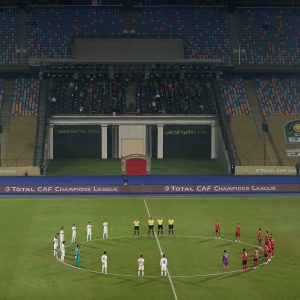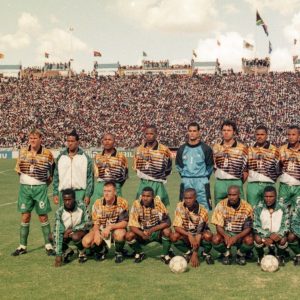Could this be the demise of Western Province Rugby?
Zelt Marais’ tumultuous tenure at the helm of the union might be heading for a dramatic end, but this welcome turn of events for many could be disastrous for the future of the union.
Author:
5 March 2021

Western Province Rugby is a mess. That, in itself, is not breaking news. The controversial reign of president Zelt Marais may have pushed the union to the breaking point, but the alternative threatens to bring a new and more dangerous chapter to the iconic union that could well lead to its permanent demise.
Leading that revolution is a man Marais fought hard to bring into the inner circle. Ronald Bantom, a highly influential school headmaster, will be elected unopposed as vice-president of the union on 8 March, and could – on the same night – oust Marais as president.
And while Bantom is feared in rugby circles for pushing a “club agenda” that goes against the grain of professional rugby, little is known about the soft-spoken administrator, other than that he is widely seen as the kingmaker and the leader of a group of rugby clubs that holds sway in Western Province Rugby.
Related article:
Bantom’s elevation to a top post has been thwarted once, but the extraordinary lengths to which Marais went to ensure his elevation in the union are likely to blow up in his face as insiders have revealed that Bantom has turned against Marais and is now behind the campaign to see him ousted.
This comes at a time when Western Province have already lost their inspirational, World Cup-winning captain Siya Kolisi to the Sharks, and botched their negotiations with American consortium MVM Holdings and had to watch it take its money to the Durban franchise. They are also struggling to keep their Springboks, yet they have offered some of them massive contracts even though they face a multimillion-rand damages claim from their erstwhile property partners, Flyt Property Investment.
Sponsor DHL has not recommitted to the team yet. Insiders in the union have said that the sponsor has a clause that will see it walk out if the Springbok players aren’t retained. DHL chief executive Hennie Heymans declined to comment on the negotiations, saying only that he would talk “when the time is right”.
Related article:
Marais has been made the fall guy and there is now a concerted campaign to remove him from office. But it is worth pointing out that the decisions that got the Western Province Rugby Football Union (WPRFU) into this mess weren’t taken by one man, even though he has owned them ever since.
Instead, that Marais has not been able to deliver on his election promises – rather than the mess WP is in – seems to be the driving force behind the coup that is under way, with many of the protagonists keeping their positions while supporting the moves to oust Marais.
How they got there
The mistakes of the past – where WP Professional Rugby was liquidated in 2017 after a botched deal with Aerios – were used to justify the need for change when Marais ascended to the presidency. He promised the world even though he, as vice-president, was the head of the financial committee when that liquidation happened.
On the evening of the election in 2018, then president Thelo Wakefield suspended Bantom because he evaded a disciplinary hearing after a spat with the head of SA Rugby’s Vuka programme, Jessie Claassen. Bantom headed to the Cape Town high court with an affidavit supporting him, signed by Marais. But the court decided the matter was not urgent, resulting in Spencer King being elected unopposed.
But when Marais took over as president, one of the first things he did was canvas openly for Bantom to be forgiven, and took the decision to drop the disciplinary process against him. And in a further startling turn, he decided to pay Bantom’s legal fees even though the WPRFU effectively “won” the case as the court didn’t agree with Bantom’s argument.
The WPRFU paid Bantom R207 000 to cover his court costs as well as its own costs to defend the action, which came close to R400 000. Bantom eventually made it into the executive. He was elected when Kevin Kiewitz resigned after Western Province walked away from the Investec deal to redevelop Newlands Stadium. Bantom then became vice-president following King’s resignation, as the latter felt that the direction Western Province was taking under Marais was against his principles.
Related article:
Bantom is widely seen as the driving force behind Marais’ election and it wasn’t long before one of the smaller clubs that openly supported both in the election – Gordons Bay Pioneers – sent a letter to Western Province calling for a no-confidence motion in Marais.
In this respect, Marais had only himself to blame as he gave a disparaging interview to website Rugby365 in which he accused board members of corruption. He went so rogue that the WP Professional Rugby board was forced to issue a public statement calling on him to withdraw his comments in their entirety and apologise so as to avoid being dragged to court.
The motion was initially thwarted as it had not mustered the 10 clubs needed by the constitution to call for a meeting on the matter, but it is now understood that the plan is to get this support and call for the motion at the special meeting where Bantom will be elected. If Marais is ousted at this meeting, it will mean that Bantom becomes president of the union.

Bantom unfazed
Bantom has not responded to repeated requests for an interview or to questions on the allegations, but has released a statement in which he blames the media for trying to “tarnish” his rugby standing.
“I am, have been and will forever be a loyal and committed rugby supporter in whatever form. Any attempts and plans to either tarnish my standing in rugby or my persona, will never succeed,” says the statement.
“Therefore, I respect the decision makers in the Western Province Rugby structures and I will never put my self-interest above the interest of the union, the members and all the stakeholders that are proud and committed Western Province Rugby supporters.
“All the internal affairs of the union will be dealt with by the union as the union has well-developed processes and structures that govern its affairs. Such matters will not be sensationalised through the media and through other agents that are keen to see such negative media coverage of the union.
“My role as one of the many executive members of the Western Province union is focused on dealing with the affairs of the union within its structures and through its processes, and I will forever strive to attain the main purpose and objectives of the union rather than giving credence to the consistent and persistent attempts by the sensational seeking [sic] media and its agents to cause a rift in the union.
“Should there be a need to communicate pertinent union matters or rugby-related matters to the rugby-loving public, this will happen through the official sources of the union rather through ‘leakers’ and ‘agents’ of discourse.”
Related article:
So what does this all have to do with the future of Western Province? Kolisi’s misgivings with the state of management have been clear to those who are near the Springbok captain. He hasn’t been the only one. In 2019, the players threatened to revolt after Gert Smal left as director of rugby and Marais was openly floating the idea of replacing him with former Springbok Sevens coach Paul Treu.
Treu had not garnered any favour during his time as Stormers assistant coach, especially after he accused head coach Robbie Fleck of sidelining him and insinuated racism. An independent law firm enquiry found that the accusations had no basis. While it has never been made public, several players are said to have testified against Treu, with Kolisi allegedly one of them.
How Kolisi left the union
New Frame is in possession of letters that prove that the players, on more than one occasion, urged Marais to sign the deal with MVM Holdings. But Marais has said publicly that the players urged him to find another equity partner. The player group – led by Kolisi and MyPlayers chair Chris van Zyl, who is also a player at WP – tried their best to engage with Marais.
“The overall feedback that the players have is excitement about the potential that such an investor (MVM) could hold for both the union and the company, as well as for all the contracted players. It is of great concern that times [sic] seems to be running out,” the first of the letters to Marais from the players says.
The players suggest in the same letter that Marais had not told them the truth. “We would like to clear up any misunderstandings following our meeting of Thursday 3 September. You suggested that there was an alternative investor. We said this must be weighed up against the MVM offer. We did not recommend that you actively set out to find a new one that could prejudice this offer, however, if there is indeed an alternative offer, you should present this offer. In the absence of such, we would be irresponsible if we do not actively encourage the MVM deal,” they told Marais, who continued to proclaim publicly that the players wanted another deal.
“We should point out that the upheavals on the company board of late and the demise of the interim committee is a cause for concern for the entire playing group and not just the ‘senior’ players. We are now fielding concerns from the entire playing group about this as well as the equity deal. We will need to keep them informed of our meetings, correspondence and progress to ensure a happy and consistent playing group.”
Related article:
In a follow-up letter, the players make it clear that the uncertainty and the drama playing out in the boardroom had unsettled them. The third letter reads: “We feel it would be irresponsible of us to enter into contract negotiations until we have some comfort as to the long-term plan, in other words that we have an equity investor that will bring real expertise or plans for the development of the franchise.”
If you consider that WP signed Kolisi as a junior, developed him into a senior player and later a Springbok, made him captain and then watched as he led the Springboks to World Cup glory, to watch him walk away from a union that has been his whole life underlines just how big a decision it was for Kolisi to uproot and move to Durban.
It further underlines the fact that WP – despite professing that Kolisi never gave any reasons for his departure, as Marais did in an interview on the SAfm radio station in February – knew full well why he left. There have been suggestions that executive committee members had become frustrated with Kolisi representing the players and didn’t mind that he’d left. Sources inside WP all tell the same story, that while coach John Dobson did his best to keep Kolisi, the hierarchy didn’t exactly go out of their way to make him stay.
Desperate attempts
In the end they lost the most marketable player in world rugby, and are likely to lose a few more in the coming weeks. They may also lose Pieter-Steph du Toit, 2019 World Rugby’s Player of the Year, who only stayed last year after a big money offer from Montpellier as a result of the intervention of DHL, which worked out a deal to keep him temporarily in the Cape.
Now, without their captain and on the brink of moving into Europe, desperate attempts have been made to separate the amateur and professional arms of the union. The professional rugby board is actively distancing itself from Marais and looking to appoint a chief executive to normalise matters after two years of turmoil.
Related article:
But the challenges facing the franchise are huge. The amateur arm is still facing a claim of damages for reneging on the property deal with Flyt. Some experts say that because they put their entire property portfolio up as security for the R112 million loan, they need to repay Investec and Remgro as the bonds on those properties had already been registered. A claim of up to R500 million in damages is not far-fetched.
If the claim succeeds, it will bankrupt what was once proclaimed the “richest rugby union in the world”.
The future looks bleak for WP even without the revolution that is currently taking place. Senior clubs in the province banded together in the second half of February to request that SA Rugby step in and take over control of the union before it is too late. If Bantom does take over, these clubs have warned privately that the situation will be much worse than under Marais.






